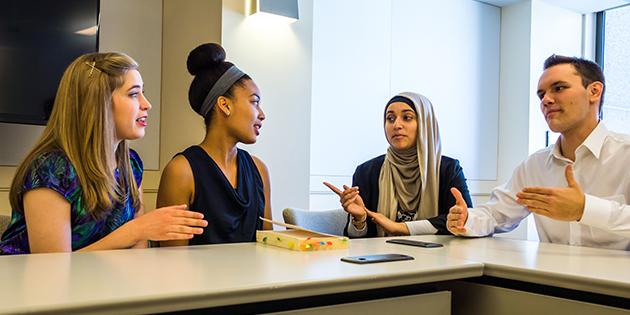
stock_photo_world/Shutterstock
Colleges and universities are facing competing pressures from those who demand unadulterated free speech on campus and those who believe speech must be limited to foster an inclusive campus culture. In the face of this pressure, many college administrators have struggled to find a balance between free speech and civility. In this month’s interview, Kevin Kruger, president of NASPA, shares his thoughts on recent free speech controversies and employment in student affairs.
Andrew Hibel, HigherEdJobs: Dr. Kruger, please briefly explain the mission of NASPA and if you have a personal mission within the organization and/or field?
Kevin Kruger, Ph.D., President, NASPA-Student Affairs Administrators in Higher Education: NASPA’s mission is to represent and be the voice of the entire student affairs position both within student affairs and in the larger higher education field. Our key issues are health, safety, and wellness as well as a strong commitment to student success: persistence and completion for all students, with a focus on low-income students, first-generation students, and students of color.
My own personal mission is to support the value of the student experience, both in the classroom and in the way students interact with the institution and the world around them outside of the classroom. A lot of student development happens outside of the classroom through extra-curriculars, internships, and interactions with peers. A significant college experience involves the academic experience in the classroom as well as the out-of-class experiences.
Hibel: In a recent article on NASPA’s website, the author discusses free speech and civil discourse. He states, “Civil discourse is closely aligned with free speech, with a significant difference: Free speech is a constitutional hallmark; civil discourse is an opportunity to create and/or enhance understanding.” What specific examples have you seen campuses doing to enhance civil discourse in order to promote understanding?
Kruger: This discussion has been happening recently, but it is also something that has been happening on college campuses for decades. There’s not only the issue of the constitutional right to free speech, but there is also inherent value in that. College should be an opportunity to hear different viewpoints from what you heard growing up as part of the development process. I think colleges have been good at bringing in different perspectives through speakers, movies, and art displays. Making students a little uncomfortable often has a positive outcome.
However, in today’s political climate speech is not just about differences. The climate has become very polarized and we see very little civil discourse. It’s one thing to have civil discourse about politics or policy. What’s difficult is to have civil discourse if someone is a white supremacist, a racist, or an anti-Semite, or is spewing hate speech. That doesn’t promote civil discourse. Having a conversation about civil discourse is different than a conversation about hate.
Hibel: Why is it important that college administrators foster civility?
Kruger: Colleges need to create safe environments for students to talk to each other about their own beliefs and hear what others may express. This core ability to hear a different person’s perspective, understand it, and talk about your perspective in a constructive way is an important skill set. This discourse is a bedrock of democracy. It’s how we become a better society. These skills are increasingly important as we move forward in today’s polarized society, and colleges are one place where we can make progress on this.
Hibel: Have you seen incivility on campuses where the institution is not monitoring or encouraging civility and, if so, what has been the outcome? What can other institutions learn from these examples?
Kruger: I think incivility is occurring all over the country regardless of what an institution is doing to monitor speech. I think institutions doing the best work are being very public about having students take part in these conversations. American University, for example, has students participate in a fresh-man seminar that exposes them to a variety of viewpoints regarding social justice issues.
Campuses need to be prepared, when someone comes to campus like Milo Yiannopoulos, to help students dialog with each other. Campuses also need to understand that for students from marginalized identities this kind of hate speech can be very threatening and interfere with their sense of safety.
Hibel: Some colleges and universities have seen an increase in student activism because of polarizing views on campus. This, in turn, has caused administrators to take notice and in some situations create policies, for example, on controversial speakers. DePaul University recently received pushback from conservatives for banning speaker, Milo Yiannopoulos. Do you think universities are doing the right thing by creating policies or are they infringing on free speech?
Kruger: Some of the activism we’re seeing is related to the polarized views on campus but some of it is generational. Generation Z is already more activated, more interested in social issues, and readier to see change than previous generations. I think we’ll continue to see a rise in activism on campus spurred by speakers as well as by things happening in government. Most campuses can’t ban speakers unless there’s some kind of concern about the health, safety, and wellness of students, so many schools have lifted temporary bans that were imposed. Campuses are now focusing on strategies and tactics to keep students safe.
Hibel: The practice of designating free speech zones, first used on college campuses during the protests against involvement in the Vietnam War, has grown increasingly controversial. What are your thoughts on the positive or negative effects of a “free speech zone” on campus?
Kruger: While free speech zones were popular during the Vietnam War and popular on college campuses, they are now frequently seen as too limiting. Free speech is an important part of campus life, and college campuses should ensure that speech doesn’t infringe on the core educational process of students attending class and learning.
Hibel: “The U.S. Census reports that less than 20 percent of 18- to 29-year-olds turn out to vote in national elections. This means it’s imperative for higher education to start the conversations about civil discourse and engagement to empower students while on campus and beyond graduation.” What do you think of this statement and do you think higher education can achieve the goal of engagement and empowerment?
Kruger: In the last election, the younger demographic voted less than the previous two elections when Obama ran, so we know we can do better. There will be as many millennial voters as baby boomers in the next election. It’s crucial that we begin to develop the habits of democratic participation while students are in college. Students need to be both informed and activated enough to go vote. Initiatives like Voter Friendly Campus and the All In Challenge encourage colleges to get students engaged. We need to reverse this trend of lower participation among young voters by helping them understand the importance of their vote and the importance of the issues they’re voting on.
Hibel: Switching gears to employment in student affairs, what do you see changing in the next 5-10 years in terms of the role of student affairs on campus and how can job seekers respond?
Kruger: The biggest hallmark of the next 5-10 years is going to be some significant fiscal challenges due to enrollment challenges and contraction in state funding of higher ed. This is really going to affect small regional colleges and universities. Going forward there will be a value placed on student affairs professionals with a broader set of skills. If fewer people are on the job, they each need to be able to complete more tasks.
The biggest lift we have is closing the attainment gap for students of color, low-income students, and first-generation college students. We need more college graduates, and we need to increase the completion rate for sectors who have not graduated at the same rates.
We also need good data. Every person going into student affairs, whether you like math or not, should have an understanding of data. In order to decide which programs stay and which go, the ability to understand and interpret data and assessment is crucial.
Student affairs and the folks working in student affairs have never been more important and central to the key issues facing higher education. Student affairs professionals are in a critical position to impact health, wellness, and student success.
Hibel: Again, looking ahead, what different or more diverse experience or skills will hiring professionals be searching for in student affairs professionals?
Kruger: Hiring professionals will be looking for people with the ability to create partnerships across departments. They’ll be looking for people with data capabilities and generalist utility infielders rather than those focused on one area. Developing key cultural competencies as student bodies become more diverse is also important, particularly for our white professionals. Colleges will be looking for people with the skills to work in multicultural institutions.
Hibel: Over the years, your continued passion for your work has always impressed me. What is your best advice for sustaining this passion in a student affairs career that has spanned multiple decades?
Kruger: I believe in the power of college and the ability of students to thrive and succeed in their chosen career. The 18- to 22-year-old time period is crucial, and student affairs can have a significant impact on helping students succeed.
